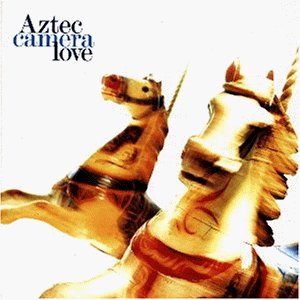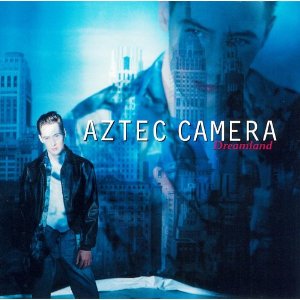

Axelrod's fantastical funk is followed up by the first of our occasional forays into the world of J-Pop with the eponymous debut album by cutesy actress Aya Ueto (2003). J-Pop is, of course, by definition extremely corny and Aya Ueto is at the corniest end of the J-Pop corn spectrum. In fact the cornometer can barely measure this album. It's got some great moments, but it does veer a little close to a Stock Aitken and Waterman style of production on occasion. There are some massive pop songs, that's how this stuff works, but Ueto is no Hikki or Ayu and it's relatively bland stuff compared to those giants of the genre. She's great in the Azumi movies though.

We would then move on to Azita's Enantiadromia (2003) which is a strange post-rockish sort of thing with half of Tortoise playing on it, but it's a vinyl only-no internet job, so we have to move straight on to an Aztec Camera marathon. Now, this may seem a bit strange that I've got a bunhc of Aztec Camera records, but these date from the time when we were getting loads of records at work so I used to pick up all kinds of stuff and that explains quite a lot of what's to come as we travel through the alphabet (five Harry Chapin albums? I mean, really, what was I thinking?). So anyway, High Land Hard Rain (1983) was notoriously written and recorded by Roddy Frame when he was only four years old. Incredible to think that a pre-teen was that adept at jazz chops and formal song structure. He wasn't, he was about seventeen, but there's something vaguely unnerving about a teenager at the turn of the 70's wanting to write jazz inflected pop-rock songs rather then being in a punk band or Bauhaus or something, but there we are. It's a really fine record, uncomfortably competent for a child, but still ragged enough around the edges to be charming, and while the songwriting is mature, the lyrics are still pleasingly naive. Second album Knife (1984) was disastrously produced by Mark Knopfler and the charming edge of High Land, Hard Rain is effectively knocked clean off, leaving simply a "mature" singer-songwriter's album with some horrible keyboards on it which sounds awful and has a serious paucity of decent songs, as Frame seemed to be trying way too hard to write big, serious tunes. It's not actually a totally terrible album ('Still on Fire' is a nice tune) but the R&B influence doesn't sit at all well with Frame's weedy Scottish musical character and it's easy to see why the album got so roundly eviscerated at the time.


After a three year break and the sacking of every other member of the band, Frame came up with the begging letter to the US charts that is Love (1987). This is a seriously insipid piece of half-baked pop music that really doesn't give much cause for hope that he would ever recover the charm of High Land, Hard Rain. It does have chart smash 'Somewhere in My Heart' on it though, and I can't deny that's a great pop song. With the blank indifference of the US clearly smarting, there wasn't another Aztec Camera album for a further three years, and when Stray (1990) was released it was clear that the US breaking ambition had been reined in, and a refocussing really worked wonders. Stray has some great songs, not least the apparently written-in-three-minutes 'Good Morning, Britain'. 'The Crying Scene', 'Notting Hill Blues', there are some great songs here, and all of them back on strictly parochial ground. The rather forced R&B stuff has bitten the bullet and we're back to the much more comfortable jazz-tinged songwriting which works much better.


Another three years and another album with 1993's Dreamland. This is almost exactly the kind of record Roddy Frame was always destined to make as he got older. It's polite, graceful, solidly written, nicely produced and entirely inoffensive. It's a delicate record, and one that announces itself in stately fashion with no pretence to anything as radical as innovation or challenge. There's absolutely nothing wrong with it except the fact that it has absolutely nothing of particular interest to say, it's just a perfectly nice early middle-age kind of record. And finally for the Camera, and for the day, it's Frame's last go under the Aztec Camera moniker before accepting that it was almost always a one-man band, Frestonia (1995). This is unsurprisingly more of the same kind of stuff as Dreamland, and I repeat absolutely word for word what I said about that album in relation to this one.


And tomorrow we finally come to the end of the A-road and branch out into the wilder (and considerably lengthier) pastures of the letter B. Let's have a wonderful evening, ready for a whole new alphabetical adventure.
No comments:
Post a Comment